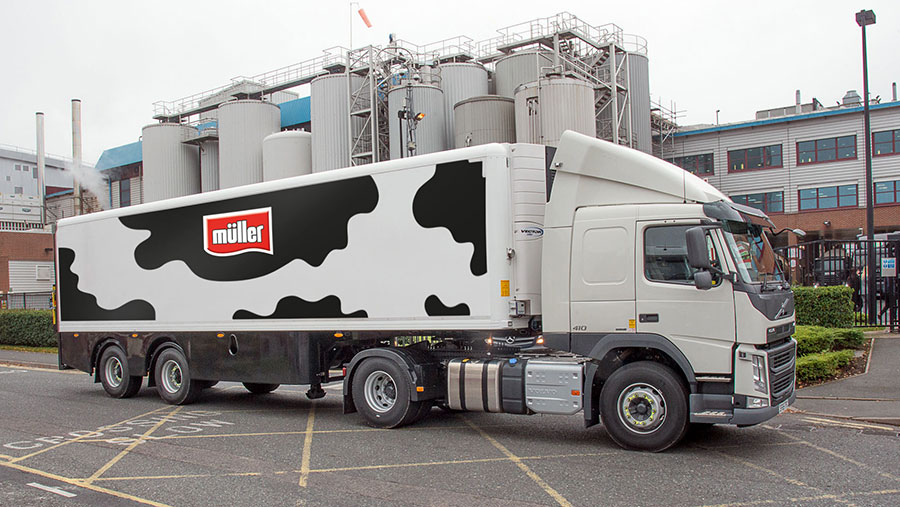Muller drop leaves producers with ‘unsustainable’ milk price

Muller’s producer representative board has made the unprecedented step of issuing a ‘stark warning’ to company bosses, following the processor’s decision to drop its milk price for March by 1.25p/litre.
The price slash, communicated to farmers on 31 January, leaves the processor’s 650 Muller Direct, non-aligned producers with 26.25p/litre for volumes with a constituent content of 4% butterfat, 3.3% protein.
See also: 7 ways to lift profits on your dairy farm
This price was unsustainable and cast significant doubts over the future viability of dairy production, while the lack of profitability would trigger an increase in the already alarming rate at which producers are quitting the industry, according a statement from the producer board.
Muller has now cut its prices by 11% since the turn of the year, seeing its liquid price fall by 3.25p/litre since January and leading the Muller Milk Group (MMG) to warn that current farmgate prices make milk production financially unviable.
The latest reduction, combined with previous cuts in December and January, will deliver an increasingly unsustainable milk price to Muller members, according to MMG chairman David Herdman.
“The past few months have seen unprecedented increases in unavoidable farm costs for all MMG suppliers.”
Farm input costs – particularly feed – have been rising from the second half of 2018 into 2019, leading to increased pressure on dairy farm margins.
“The rise in costs, coupled with Muller’s decision to drop the farmgate price to 26.25ppl, has left many Muller Direct farmers in a dire financial position,” added Mr Herdman.
“Unless some economic realities can return margins in the liquid market place, then the prospects for future milk production from farms exposed to this sector must be called into significant doubt.”
Scale of losses
MMG estimates that compared to the average supermarket aligned price for February, based on a cost of production model, Muller non-aligned producers were missing out on 4.76p/litre compared with their aligned cousins.
For an average Muller dairy farmer producing 1.5m litres a year, this would equate to an annual difference of £71,400 a farm or £46.4m across its pool of 650 Direct producers.
Mr Herdman said, “Unless the present price situation is reversed with some immediacy, [the board’s] work will be meaningless for an increasing number of our members who will be faced with no alternative but to exit milk production.”
Muller response
The value of milk had been affected by supplies being well ahead of forecast, according to Muller milk supply director Rob Hutchison.
December 2018 milk production hit a 25-year high, with 1,234m litres being produced for the month, according to AHDB Dairy.
“At times like this in the market cycle it is important that processors retain the flexibility to be able to offer different solutions.”
Mr Hutchison added that farmers who signed up to the Müller Fixed Price Contract had significant protection from current market volatility.
A spokesperson added that Muller would not comment on the MMG release.
Expert market analysis from Peter Meeham, INTL FCStone
The dairy market continued on its rollercoaster ride in recent weeks, amplified by volatility in currency markets. The European SMP quotation in euro terms has moved up 10.3% in 2019.
Strengthening sterling offset a large chunk of the gains, with skim milk powder (SMP) up 6.9% in sterling terms. EEX SMP futures also marched higher with the Jan-19 to Aug-19 contracts up 6.9% since the beginning of the year.
The EU butter quotation saw strong gains also, up 8% over the five weeks, but also limited by currency moves to +4.7% on a sterling basis.
EEX butter futures, however, were softer, with the Feb-19 to Aug-19 contracts down 2.1% on average for the year to date.
Robust demand on global markets in recent months has helped support commodity prices. EU dairy exports were generally stronger in November, while New Zealand’s SMP and whole milk powder exports were higher in November and December.
The EU Commission sold a further 18,500 tonnes of Intervention-SMP, meaning 99% of the Intervention stocks have now been sold.
UK milk production, meanwhile, rounded out 2018 with a record for December, increasing by 1.2% on 2017, putting collections for the full year 0.2% ahead of 2017.
